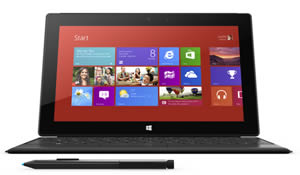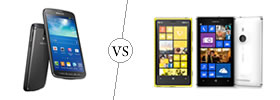Difference between Microsoft Surface Pro and Asus Padfone Infinity
Key difference: The Microsoft Surface Pro features a 10.6-inch ClearType HD screen with approximately 208 ppi pixel density. The device runs Microsoft Windows 8, which the same OS that is being run in various laptops and desktops. The device has Full Windows capability. The Asus Padfone Infinity smartphone is a slick 5-inch full HD 1920x1080, Super IPS+ with Capacitive Multi touch panel and provides approximately 441 ppi density. The device is a bar phone, with curved corners giving it a similar look to the ‘iPhone’ and ‘HTC One’. The Asus Padfone Infinity Dock is basically the 10-inch tablet shell that allows users to dock their phone into the tablet by sliding it into a slick slot on the back.

Today is the world of smartphones and tablets. So, much so that tablets and smartphones are attempting to replace the traditional and bulky desktops and laptops. The Microsoft Surface is a series of tablets that aim to do just that. The advantage that the Surface has over a number of other tablets is that it will run the Microsoft Windows operating system, whereas most other tablets run Android. The iPad runs the iOS which is more similar to the iPhone OS rather than a Mac OS. Hence, at the time of its release, the Microsoft Surface was touted as the perfect cross between a tablet and a laptop. It was initially released February 2013.
The Microsoft Surface Pro features a 10.6-inch ClearType HD screen with approximately 208 ppi pixel density. The screen is full HD, a feature not readily avilable in most tablets. The screen affords the true 16:9 aspect ratio which matches most movies and shows, eliminating the black bars that pop up. The Microsoft Surface Pro also has a 10 point multi-touch.
Microsoft Surface Pro is powered by a Dual-core 1.7 GHz Intel Core i5-3317U processor, which is backed by 4 GB of RAM. It also features two cameras, a front-facing and a rear-facing. Both are 720p HD LifeCams with True Color.
The device runs Microsoft Windows 8 Professional, which the same OS that is being run in various laptops and desktops. The device has Full Windows capability. It can practically run all Windows programs, including games.
The device comes in three memory size variants: 64 GB, 128 GB and 256 GB. However, the actual memory storage available for the user is 23GB for the 64 GB variant and 85GB for 128 GB variant. The actual user memory available for the 256 GB is not currently specified. The size disparency is because of the system backup storage recovery partition, which can be manually deleted by experiences users.
The input devices for the Microsoft Surface Pro includes an on screen keyboard, a physical keyboard that doubles as a cover, as well as a pen stylus. The physical keyboard can be purchased separately or as part of a combo with the device itself. It attaches magnetically and electrically to the base of the tablet.
Physically, the device is quite similar to the Microsoft Surface RT, same look, and same color. However, it is thicker than the RT and has a full USB 3.0 port, in addition to a Micro-HDMI port, microSDXC card slot, Headset jack, Mini DisplayPort and Cover port. Similar to RT, it also has a built in kickstand, which has been critized by some as beinf too difficult to manage. Additionally, Microsoft has also acknowledged issues with the stylus pen. The stylus pen has been reported by some users as randomly not working correctly, especially with older applications that do not have complete pen support. There have also been some reported issues with Wi-Fi and while waking up from standby mode.
 Asus has announced its latest phone and tablet in the Padfone series, knighted the Asus Padfone Infinity. The original Asus Padfone did not reach the Western Shores but the company states that the Padfone Infinity is set for world-wide launch in the second quarter of 2013. Similar to the original Padfone, the Padfone Infinity is available just as smartphone or along with a tablet dock that allows seamless transition between phone and tablet needs. The Padfone Infinity is a pretty intriguing concept that allows the phone to dock on the tablet, which powers the tablet and transfers all the data on the tablet for use. However, without the phone the tablet is just a shell without any ‘brain’ of its own. The phone/tablet is set to provide serious competition to rivals Sony Xperia Z Tab, iPad 4 and Samsung Galaxy Tab. Let’s cover its features separately.
Asus has announced its latest phone and tablet in the Padfone series, knighted the Asus Padfone Infinity. The original Asus Padfone did not reach the Western Shores but the company states that the Padfone Infinity is set for world-wide launch in the second quarter of 2013. Similar to the original Padfone, the Padfone Infinity is available just as smartphone or along with a tablet dock that allows seamless transition between phone and tablet needs. The Padfone Infinity is a pretty intriguing concept that allows the phone to dock on the tablet, which powers the tablet and transfers all the data on the tablet for use. However, without the phone the tablet is just a shell without any ‘brain’ of its own. The phone/tablet is set to provide serious competition to rivals Sony Xperia Z Tab, iPad 4 and Samsung Galaxy Tab. Let’s cover its features separately.
The Asus Padfone Infinity smartphone is a slick 5-inch full HD 1920x1080, Super IPS+ with Capacitive Multi touch panel and provides approximately 441 ppi density, making the screen visibly sharp, crisp and clear. The device is a bar phone, with curved corners giving it a similar look to the ‘iPhone’ and ‘HTC One’. The phone has a sleek metallic chassis, with a silver brushed look on the back. The phone is powered by the latest 1.7GHz quad-core Krait Qualcomm Snapdragon 600, providing fast responsiveness from the device. It offers the latest Android v4.2 Jelly Bean. The phone has a 2GB RAM and is available with 32/64 GB of internal storage capacity. The phone houses a 13MP primary camera and a 2MP secondary camera, with HD recording capability. The massive battery power allows the phone to provide up to 19 hours of 3G talk time. The company also introduced a bunch of new features such as Asus Echo, SuperNote, ASUS Story, Instant Dictionary and two years’ free Cloud Storage with 50GB ASUS WebStorage. The Asus Echo is the newest personal assistant, similar to Siri that allows the user to activate a number of features (search contacts, make calls, pick up incoming calls, activate the camera shutter for self-portraits, set alarms, change settings, etc) on the phone using voice commands. The new SuperNote supports real-time handwriting to text conversion and is sensitive enough to accurately translate from handwriting to text. Asus Story allows users to create albums and story lines, while Instant Dictionary allows users to translate words, phrases and sentences in emails, web pages or apps.
The Asus Padfone Infinity Dock is basically the tablet shell that allows users to dock their phone into the tablet by sliding it into a slick slot on the back. The slot comes with rubber gromits that ensures that the phone locks into place and does not slide out and fall. When the phone is docked on the tablet, the tablet and the phone synchronize automatically and the apps that were on the screen of the phone automatically re-sizes itself and pops up on the tablet screen. The tablet sports a 10.1 Full HD 1920x1080, Super IPS+ with Capacitive Multi touch panel, similar to the phone, providing a clear and detailed picture on the tablet. The screen on both, the phone and the tablet, have a Corning Gorilla Glass covering. The tablet does not have a processor or anything such hardware on it. It does offer a few advantages to the phone. The tablet houses a 1MP front camera for video calls. The tablet is also capable to output 1080 Full HD video via Micro-USB compatible MyDP interface. The device also has a dialer and is able to accept and make phone calls and send text messages. The phone and the tablet have speakers have the ASUS Audio Wizard audio enhancement providing rich audio experience. The battery as a massive 5000 mAh Li-Polymer, that enhances the battery power of the phone allowing up to 40 hours of 3G talk time. The tablet also has the power to charge the phone three times with a full battery. The tablet starts charging the battery of the phone, when the phone is docked into the tablet.
The high-end phone/tablet hybrid comes with a high-end price of EUR 999 and should be around US$ 1300 when it finally reaches the States. The main purpose of such a hybrid is so that people can use one data plan and it eliminates the need for manually synchronizing the tablet to phone and vice-versa. The phone has also been criticized for the lack of the keyboard, which was one of the features available in the original Padfone. Will the phone be a massive success or failure will be seen when the phone finally becomes available world-wide.
The information for the detailed table about the two devices has been taken from the Microsoft website, the Asus website, GSMArena.com and Wikipedia.
|
|
Microsoft Surface Pro |
Asus Padfone Infinity |
|
Launch Date |
February 2013 |
Expected Release Q2/2013 |
|
Company |
Microsoft |
Asus |
|
Size |
275 x 173 x 13 mm |
Phone:143.5 x 72.8 x 8.9 mm Pad: 264.6 x 181.6 x 10.6 mm |
|
Display |
10.6 inches ClearType HD screen |
Phone: 5-inches, Full HD 1920x1080, Super IPS+ with Capacitive Multi touch panel Pad: 10.1-inches, Full HD 1920x1080, Super IPS+ with Capacitive Multi touch panel |
|
Screen |
1920 x 1080 pixels (~208 ppi pixel density) 16M colors |
Phone: 1080 x 1920 pixels (~441 ppi pixel density) Pad: 1920x1080 pixels (~441 ppi pixel density) |
|
Protection |
VaporMg casing |
Corning Gorilla Glass on both the phone and the pad. |
|
Weight |
910 grams |
Phone: 141 grams Pad: 530 grams |
|
2G Network |
N/A |
GSM 850 / 900 / 1800 / 1900 |
|
3G Network |
N/A |
HSDPA 900 / 2100 |
|
4G Network |
N/A |
LTE 800 / 1800 / 2600 / 2100 |
|
GUI |
Windows 8 Pro |
Asus' UI |
|
CPU speed |
Dual-core 1.7 GHz Intel Core i5-3317U |
1.7GHz quad-core Krait Qualcomm Snapdragon 600 |
|
GPU |
Intel HD Graphics 4000 |
Adreno 320 |
|
OS |
Windows 8 Pro |
Android v4.2 (Jelly Bean) |
|
Chipset |
Intel Core i5 |
Qualcomm APQ8064T Snapdragon 600 |
|
RAM |
4GB RAM—Dual Channel Memory |
2 GB |
|
SIM Size |
N/A |
nanoSIM |
|
Internal Memory |
64/128/256 GB |
32/64 GB |
|
Expandable Memory |
microSDXC card slot |
N/A |
|
Sensors |
Ambient light sensor, Accelerometer, Gyroscope, Compass |
G-Sensor, E-compass, Gyroscope, Proximity, Light Sensor |
|
Connectivity |
Wi-Fi, Wi-Fi direct, Bluetooth, USB |
GPRS Class 10, EDGE Class 10, LTE, Bluetooth, Wi-Fi, USB, Wi-Fi hotspot. |
|
Data |
WLAN, Bluetooth, USB |
GPRS, EDGE, WLAN, Bluetooth, NFC, USB, USB Host. |
|
Speed |
- |
DC-HSPA+, 42 Mbps; HSDPA, 21 Mbps; HSUPA, 5.76 Mbps; LTE, Cat3, 50 Mbps UL, 100 Mbps DL |
|
WLAN |
Wi-Fi (802.11a/b/g/n) |
Wi-Fi 802.11 a/ac/b/g/n, Wi-Fi Direct, dual-band, Wi-Fi hotspot |
|
Bluetooth |
Bluetooth 4.0 Low Energy technology |
Bluetooth v4.0 with A2DP |
|
USB |
Full-size USB 3.0 |
microUSB v2.0 (MHL), USB Host |
|
Primary Camera |
720p HD LifeCams with True Color |
13 MP, 4128 x 3096 pixels, autofocus camera |
|
Secondary Camera |
720p HD LifeCams with True Color |
Phone: 2 MP 1080p@30fps camera Pad: 1MP front camera |
|
Video |
720p @ 30fps |
1080p@30fps |
|
Camera Features |
|
|
|
Sound Enhancement |
Microphone, Stereo speakers |
ASUS Audio Wizard ASUS Sonicmaster |
|
Audio supported formats |
MP3/ WAV/ eAAC+ player |
MP3/3GP/AAC/AAC+ |
|
Video supported formats |
MP4/ DivX/ Xvid/ H.264/ H.263 player |
MP4/H.264/H.263 player |
|
Battery Capacity |
42 W-h |
Phone: 2400 mAh Li-Polymer Pad: 5000 mAh Li-Polymer |
|
Talktime |
- |
Phone: 3G: 19 hours Pad: 3G: 40 hours |
|
Standby Time |
- |
Phone: 3G: 410 hours Pad: 3G: 920 hours |
|
Available Colors |
Dark Titanium |
Titanium Gray, Champagne Gold, Hot Pink |
|
Messaging |
Email, Push Email, IM |
SMS(threaded view), MMS, Email, Push Email, IM |
|
Browser |
HTML5 |
HTML5 |
|
Radio |
No |
FM radio |
|
GPS |
Yes |
A-GPS & GLONASS |
|
Java |
- |
Yes, via Java MIDP emulator |
|
Additional Features |
|
|
Image Courtesy: microsoft.com, asus.com









Add new comment